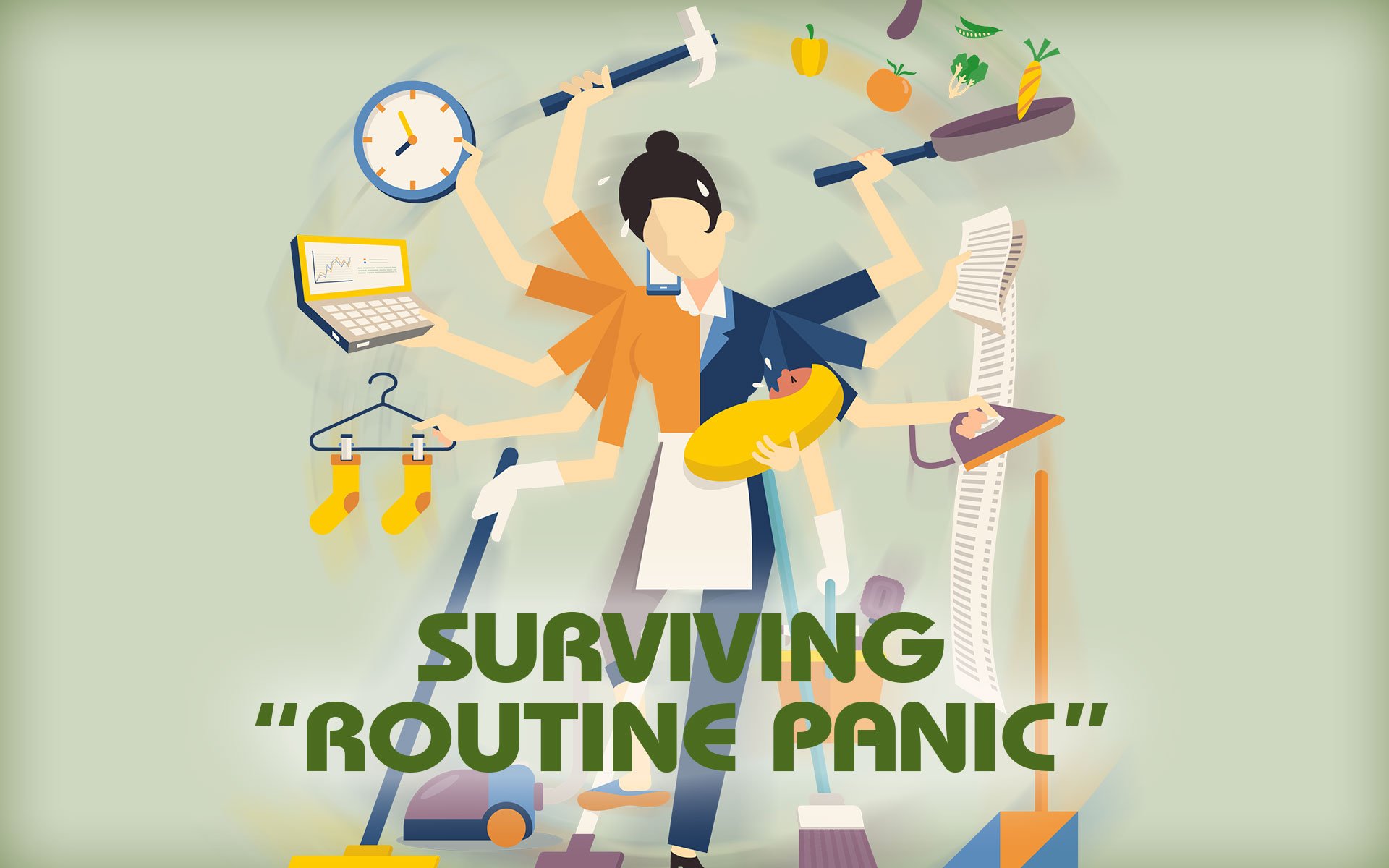
It's February already, and it feels like we were just celebrating the Christmas season and the beginning of a new year. How does time fly so fast? We work at a breathless pace to prepare for these holidays, and we never seem to have enough time to fully enjoy them. I call this hectic way of living, "routine panic," and it is not only limited to the holiday season. For many of us, it's a pattern of everyday life. Can you and your family relate?
Shirley and I know all too well the temptation to allow the busyness of our schedules to get the best of us. During the early years of our ministry efforts, everything was happening at a breakneck speed. Every week there were new interviews, speaking engagements, writing assignments, and radio broadcasts that required my devoted attention. That left little time for reuniting with family, and I didn't like it. Shirley and I quickly came to a decision to slow things down and ensure we were taking care of first things first.
I addressed this same topic in my book, Bringing Up Boys, and I'd like to share with you a particular passage in a chapter that I titled, "Chasing the Caterpillar." I believe you will find it very helpful as the world we live in seems to be turning faster with each passing year.
The great French naturalist Jean-Henri Fabre once conducted a fascinating experiment with processionary caterpillars, so-called because they tend to march in unison. He lined them around the inner edge of a flowerpot and then monitored them carefully as they marched in a circle.
At the end of the third day, he placed some pine needles, which is the favorite food of caterpillars, in the center of the pot. They continued walking for four more days without breaking rank. Finally, one at a time, they rolled over and died of starvation, just inches from their ideal food source.
These furry little creatures remind me in some ways of today's moms. Most of them are trudging around in circles from morning to night, exhausted and harried, wondering how in the world they can get everything done. Many are employed full-time while also taking care of families, chauffeuring kids, fixing meals, cleaning the house, doing laundry, and trying desperately to maintain their marriages, friendships, family relationships and spiritual commitments. It is a backbreaking load.
Sadly, this overcommitted and breathless way of life, which I call "routine panic," characterizes the vast majority of people in Western nations.
Are you one of these harried women running in endless circles? Or are you a man with the same problem? Have you found yourself too busy to read a good book or take a long walk with your spouse or hold your 3-year-old child on your lap while telling him or her a story? Have you taken time to study God's Word—to commune with Him and listen to His gentle voice? Have you eliminated almost every meaningful activity in order to deal with the tyranny of a never-ending "to-do" list? Have you ever asked yourself why in the world you have chosen to live like this? Perhaps so, but it is not an easy problem to solve. We live our lives as if we're on freight trains that are rumbling through town. We don't control the speed—or at least we think we don't—so our only option is to get off. Stepping from the train and taking life more slowly is very difficult. Old patterns die very hard indeed.
When was the last time you had friends drop by unexpectedly for a visit? For many of us it's been entirely too long. There was a time when families made a regular habit of packing into the car and driving to a friend's home for an afternoon of good conversation and a piece of banana cream pie. It was one of life's special little pleasures.
I'll never forget the times as a boy when I would hear a knock on the door and scurry to see who was there. The screen would crack open a few inches and a familiar voice would echo through the house, "Is anybody home?"
Mom would rush to put on a pot of coffee and slice some pie from what we referred to as an icebox back then, and for the rest of the afternoon we'd sit and talk with our friends—about nothing and about everything. Finally, it came time for our friends to leave, and we'd hug them goodbye, encouraging everyone to come again sometime.
Sadly, that kind of spontaneous camaraderie is difficult to achieve in today's fast-paced world. The pressures and busyness of life have all but destroyed the sense of community that was once common among families and friends. We seldom—if ever—drop in on friends unannounced. And even if we did, they would probably have to cancel a string of plans and appointments in order to be with us. Thus, we go about our days, careening through life, glancing at our watches and wondering why we don't have very many close friendships.
Robert D. Putnam, a political science professor at Harvard University, addresses the growing trend toward overcommitment and isolation in his important book, Bowling Alone: The Collapse and Revival of American Community. He interviewed nearly 500,000 people over the past 25 years and concluded that we are increasingly distancing ourselves from each other. The very fabric of our social connections has plummeted, impoverishing our lives and communities. We know our neighbors less, socialize with friends less often and even grow distant from our families. We belong to fewer organizations that actually meet, such as the Jaycees, Shriners, Elks and other service clubs. Only mailing list membership has continued to expand. The same number of people are bowling now as in the past (hence the title of Putnam's book), although more of them are doing it alone. Participation in bowling leagues has declined 40 percent since 1980.
In politics, we remain reasonably well-informed spectators of public affairs, but fewer of us actually partake in the game. In religious life, "Americans are going to church less often than we did three or four decades ago, and the churches we go to are less engaged with the wider community."
At the same time, the so-called "electronic church," referring to services broadcast on television, radio or the Internet, has been gaining even more popularity in recent years, as a result of the pandemic. While it reaches some viewers and listeners who would never attend a church, watching from afar is no substitute for the fellowship of believers that involves the church body. The apostle Paul wrote, "Let us not give up meeting together, as some are in the habit of doing, but let us encourage one another" (Hebrews 10:25, NIV). How can we encourage one another when we're worshiping in our homes on Sunday mornings?
Putnam says that the most significant factor behind the growing isolation is the increase in the number of two-career families, thus distancing men and women from their traditional social networks. Bingo! There is simply no time for much of anything but work and maintaining a household.
Television, the Internet, and other forms of electronic communication have also weakened the linkage between generations and interfered with the transmission of family traditions. When these causes are considered together, they take much of the meaning and enjoyment out of life. In short, Putnam says that the "social capital" of America is shrinking, resulting in more divisiveness and a general breakdown of mutual trust.
Other studies confirm the same trends and conclusions. Overcommitment and isolation are pandemic. Oxford Health Plans of New York, New Jersey and Connecticut found that one in six employees in the United States is so overworked that he or she can't even take the vacation time earned because of job demands. "Americans," the pollsters said, "are already the most vacation-starved people in the industrialized world, with an average of 13 vacation days per year, compared with 25 or more in Japan, Canada, Britain, Germany and Italy."
The study revealed that 32 percent of those surveyed said they work and eat lunch at the same time, and another 32 percent said they never leave the building once they arrive at work. Some 34 percent said they have such pressing jobs that they have no breaks or downtime while on the job. Nineteen percent say their job makes them feel older than they are, and 17 percent say work causes them to lose sleep at night. Seventeen percent said it is difficult to take time off or leave work even in an emergency, and 8 percent said they believe if they were to become seriously ill, they would be fired or demoted. We are working ourselves to death.
I can't overstate how important these findings by Robert D. Putnam and others are from my perspective. The harried lifestyle that characterizes most Westerners leads not only to the isolation of people from each other in the wider community, it is also the primary reason for the breakdown of the family. Husbands and wives have no time for each other and many of them hardly know their children. They don't get together with relatives, friends or neighbors very often because they are tyrannized by a never-ending "to-do" list.
Repeatedly during my research in writing this book, which took longer than anything I have ever written, I came face-to-face with the same sad phenomenon. Parents are simply too distracted and exhausted to protect and care for their children.
Pollster George Barna saw evidence of this trend too. He wrote, "It is becoming less common these days for a teenager to have time isolated for focused interaction with family members. Most of the time they spend with their family is what you might call 'family and time': family and TV, family and dinner, family and homework, etc. The lives of each family member are usually so jam-packed that the opportunity to spend time together doing unique activities — talking about life, visiting special places, playing games and sharing spiritual explorations — has to be scheduled in advance. Few do so." (This issue for teenagers has only exponentially worsened by the ubiquitous availability of screen time that smart phones have afforded children. Sadly, many parents are equally tied to their phones and set a poor example for their kiddos.)
I find that children and young people are starved today for family life as it used to be—but almost never is. When my late father-in-law, Joe Kubishta, was 89, and Shirley's mom, Alma, was 90, young people still loved to come see them. Why? Because everything there was so much fun. They had time to play table games, laugh, eat and talk about whatever interested the young adults. Nobody was in a hurry. If they were ever called on the phone, they were always available to talk.
One of their frequent visitors was an unmarried man named Charlie who loved the Kubishtas. When he had to move away, he drove 60 miles to their house with a rosebush that he planted in their backyard. He just wanted to make sure Joe and Alma didn't forget him. This elderly man and woman provided something for Charlie and others who were younger that is simply not available elsewhere. How sad.
In closing, let me emphasize one more time that the trouble we are having with our children is linked directly to routine panic and the increasing isolation and detachment from you, their parents.
Furthermore, boys typically suffer more from these conditions than do girls. Why? Because boys are more likely to get off-course when they are not guided and supervised carefully. They are inherently more volatile and less stable emotionally. They flounder in chaotic, unsupervised and undisciplined circumstances. Boys are like automobiles that need a driver at the steering wheel every moment of the journey, gently turning a half-inch here and a quarter-inch there. They will need this guidance for at least 16 or 18 years, or even longer. When left to their own devices, they tend to drift toward the center divider or into the ditch, toward misbehavior or danger. Yet 59 percent of today's kids come home to an empty house. It is an invitation to mischief or disaster for rambunctious males, and the older they get, the more opportunities they have to get into trouble. Today, when the culture is in a tug-of-war with parents for control of our children, we can't afford to be casual about their care and training.
Your task as a mother, in conjunction with your husband, is to build a man out of the raw materials available in this delightful little boy, stone upon stone upon stone. Never assume for one moment that you can "do your own thing" without serious consequences for him and his sister. I believe this task must be your highest priority for a period of time. It will not always be required of you. Before you know it, that child at your feet will become a young man who will pack his bags and take his first halting steps into the adult world. Then it will be your turn. By all expectations, you should have decades of health and vigor left to invest in whatever God calls you to do. But for now, there is a higher calling. I feel obligated to tell you this, whether my words are popular or not. Raising children who have been loaned to us for a brief moment outranks every other responsibility. Living by that priority when your kids are small will produce the greatest rewards at maturity.
I hope you know that I am not trying to tell you how to run your life. You and your spouse can discern what is best for your family. No one can tell you which road to take. Some women are emotionally geared for careers and would not want to be stay-at-home moms even if they had the resources to do so. They resent anyone criticizing them for having a career, and I don't blame them. It is a personal decision that is no one's business but their own. I do think, however, that there should be a way to avoid living in a state of perpetual chaos. It is hard on adults but creates havoc for children. From my perspective, almost anything is better than chasing the lead caterpillar endlessly around the flowerpot.
My prayer is that a scale-back from a lifestyle of "routine panic" will someday occur. If it ever becomes a movement, it will portend wonderfully for the family. It should result in fewer divorces and more domestic harmony. Children will regain the status they deserve and their welfare will be enhanced on a thousand fronts. We haven't begun to approach these goals yet, but we can only hope that a significant segment of the population will awaken someday from the nightmare of overcommitment and say, "This is a crazy way to live. There has to be a better way than this to raise our kids. We will make the financial sacrifices necessary to slow the pace of living."
I hope you have "slowed down" enough to catch the message of this letter. Life and the many relationships God has entrusted to us are far too important to allow busyness and distractions to set our daily priorities. We must continually discipline ourselves to put first things first. For those of you who have children at home, make sure you are carving out time in your daily and weekly schedules to engage their hearts and minds for the Lord. Eating and praying together are proven ways to assure your kids stay grounded during their formative years. Reading a story or playing a game together are also novel but effective ways to cultivate conversations and lasting relationships.
Before I close, I want to extend my gratitude again to all of you who supported JDFI at the end of 2023. We are a donor-supported ministry, and we could not accomplish what we do without you. I'm also thrilled to share that we are launching a number of vital initiatives in 2024, and I'm excited to see how God will use each of them.
One of the key initiatives centers around my 90-second commentaries that were heard by millions of people through the years. To allow for a greater distribution across radio networks, we are editing these commentaries down to 60 seconds entitled, "The Dr. Dobson Minute." Please pray for our team as they prepare to launch these new commentaries in March. If you are positioned to help, this initiative as well as our policy and culture-related ones are still in need of additional funding. Here is a short explanation of the initiatives.
Thank you for standing with us, and may our Lord bless you and keep you in the days ahead.
Sincerely,

James C. Dobson, Ph.D.
Founder Chairman
Dr. James Dobson Family Institute
This letter may be reproduced without change and in its entirety for non-commercial and non-political purposes without prior permission from the Dr. James Dobson Family Institute. Copyright, 2024 JDFI. All Rights Reserved. International Copyright Secured. Printed in the U.S.








